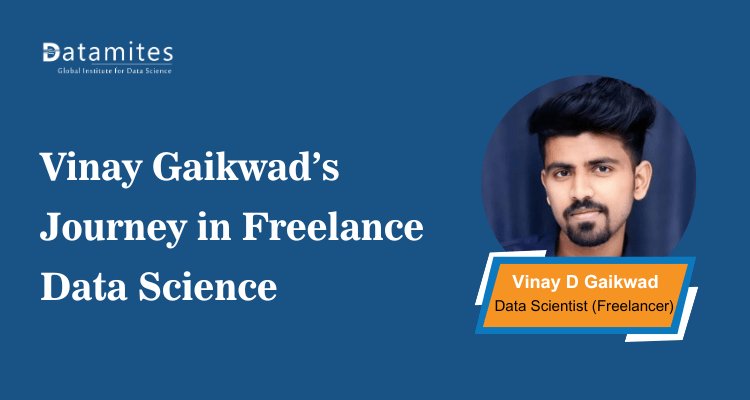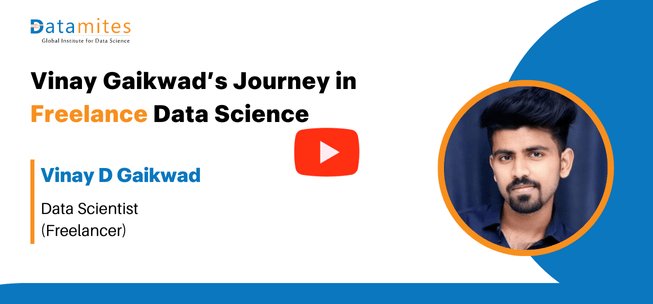Vinay Gaikwad’s Journey in Freelance Data Science
Vinay Gaikwad’s journey shows how mentorship and hands-on learning can lead to a successful freelance data science career.

Vinay Gaikwad’s journey highlights how dedication, structured learning, and practical experience can open doors to freelance opportunities in data science. A 2024 engineering graduate, Vinay initially explored web development but was guided by a mentor to consider data science. He enrolled in DataMites’ classroom program in Pune, where hands-on projects and training in Python, SQL, and machine learning equipped him with the skills needed to excel.
By taking on multiple projects, completing internships, and attending several interviews, Vinay gained the confidence to step into freelancing. His story demonstrates that with persistence, practical exposure, and mentorship, even fresh graduates can successfully enter the growing freelance data science market. Aspiring professionals can look to Vinay’s experience as a roadmap for building skills, embracing opportunities, and navigating a non-traditional career path in data science. You should watch DataMites success story sessions like this one; they offer not just inspiration but also actionable insights to help you carve your own path.
How Did Vinay Gaikwad Start His Freelance Data Science Career with DataMites?
Discover how Vinay Gaikwad transitioned into freelance data science through guided training, hands-on projects, and practical interview experience.
Q1. Can you start by introducing yourself and your academic background?
I’m a 2024 engineering graduate. During my final year, I moved to Pune to pursue data science training. After researching various institutes and attending demo sessions, I chose DataMites because it aligned with my learning goals and had a strong reputation in the field.
Q2. What inspired you to pursue data science over other career options?
Initially, I began with web development, as many of my peers were doing the same. However, one of my professors encouraged me to explore new fields and introduced me to data science. I found the combination of statistics and machine learning fascinating, and with growing opportunities in this domain, I shifted my focus entirely to data science.
Q3. How was your learning experience at DataMites?
The training covered Python, statistics, machine learning, SQL, and practical project work. Python was easy to grasp, while machine learning required consistent practice. SQL was challenging at first, but regular exercises helped. I also realized that while math skills are useful, interviews focus more on model application and problem-solving rather than deep theoretical math.
Q4. Could you tell us about the projects you worked on during your course and internship?
I worked on projects like cell phone price prediction, customer transaction analysis, handwritten digit recognition, and COVID-19 time-series forecasting. Later, I also took on a rice leaf disease detection project involving image data. These diverse projects gave me practical exposure across domains and were very useful in interviews.
Q5. How did you start your first freelance data science project, and what were your goals?
After attending several interviews, I got an opportunity to collaborate with a professional already working in the industry. He shared assignments with me, which I successfully completed. This experience provided the real-world exposure and learning I was seeking. My main goal was to gain practical experience, sharpen my skills, and while freelancing offered flexibility, I am also aiming for a full-time role in data science to work on larger projects and continue learning.
Q6.How did you get your first freelance project?
I got my freelance project through the DataMites placement team. They connected me with an alumnus who was already working on a project and needed support. This was my first freelance opportunity, and it provided valuable learning and real-world experience.
Q7. Before freelancing, how many interviews did you attend?
I attended around 7 to 9 interviews for roles in data science and analytics. Some came from walk-ins, some through LinkedIn, and 2–3 were arranged by DataMites placement support.
Q8. How did you find walk-in interview opportunities?
I filtered opportunities directly on LinkedIn by searching for “walk-in data science interviews in Pune.” This strategy helped me attend multiple interviews, which improved my confidence and interview readiness.
Q9. What kind of questions did interviewers usually ask?
Most questions were focused on Python programming, SQL queries, and practical applications of machine learning models. In some cases, I was asked to explain algorithms like linear regression, boosting, and bagging. Interviewers were more interested in how I applied models rather than just theoretical details.
Q10. Were you asked to code during interviews?
Yes, several times. Some interviewers asked me to write Python code directly on a laptop, while others wanted code written on paper. Writing code on paper was harder, as you don’t get compiler hints, but practicing frequently made it easier to handle.
Q11. How did you handle failure after multiple interview rejections?
At first, I felt discouraged after being rejected in the final rounds, especially for my dream job. But I soon realized every interview taught me something new. Each rejection became a stepping stone to improve my skills and prepare better for the next opportunity.
Q12. How much time did you dedicate to interview preparation?
Whenever I had an interview scheduled, I would plan my routine 2–3 days in advance. I spent extra time on Python and SQL since those were my weaker areas, and revised machine learning concepts for a couple of hours daily.
Q13. What resources did you use for interview preparation?
Interestingly, I relied heavily on ChatGPT for preparation. I would ask it to explain concepts step by step, generate coding practice problems, and even simulate interview questions. It felt like having a personal teacher guiding me through the preparation process.
Q14. What advice would you give to aspiring data scientists?
Stay consistent, practice coding regularly, and work on diverse projects to strengthen your portfolio. Don’t get discouraged by failures; each interview is an opportunity to improve. And most importantly, never give up. Success in data science often comes to those who keep learning and applying, no matter how many setbacks they face.
Refer to these articles:
- Freelancing in Data Science: Samapika Singh’s Insights
- Abuzar’s Journey: From Fresher to Data Engineer Success
- Nirmal Vani’s Journey to Success in Data Science
Key Insights from Vinay Gaikwad’s Freelance Data Science Journey
Here are the key lessons and insights from Vinay Gaikwad’s freelance data science journey that can guide anyone looking to start or grow a career in data science.
- Transition to Data Science: Vinay initially pursued web development but shifted to data science after guidance from a teacher and exploring career potential.
- Structured Learning: He attended classroom training at DataMites in Pune, focusing on Python, SQL, statistics, and machine learning.
- Hands-On Projects: Vinay completed multiple real-world projects, including price prediction, customer transactions, handwritten recognition, COVID-19 time series analysis, and rice detection.
- Internship Experience: His internship at DataMites provided practical exposure, helping him strengthen technical skills and gain confidence in handling diverse datasets.
- Freelance Opportunities: Vinay successfully entered freelance data science, gaining exposure to end-to-end project execution and professional guidance from mentors.
- Interview Preparation: He attended 7–9 interviews, including walk-ins and LinkedIn opportunities, learning from each experience and improving his skills progressively.
- Importance of Practice: Python coding and SQL queries required persistent practice; revisiting frequently asked questions helped him perform better in interviews.
- Learning from Failure: Multiple interview rejections helped Vinay develop resilience, persistence, and a growth mindset essential for career success.
- Mentorship and Guidance: He credited mentorship, structured guidance, and resources like ChatGPT for clarifying doubts and enhancing learning.
- Love for Data: Vinay emphasized that genuinely enjoying data and understanding its stories is crucial for long-term success in data science.
- Freelance Benefits: Freelancing offered flexibility, end-to-end project experience, and the opportunity to become an independent professional while saving costs for clients.
- Career Goals: While gaining freelance experience, Vinay’s ultimate aim remains securing a full-time role where he can continue learning and growing in data science.
- Strategic Job Search: Leveraging multiple channels DataMites placements, LinkedIn, and walk-in interviews enhanced his opportunities to gain experience.
- Practical Knowledge Over Theory: Interviewers focus more on applied skills, project implementation, and model deployment rather than deep mathematical theory.
- Persistence is Key: Consistent effort, practice, and never giving up were crucial elements that allowed Vinay to succeed in entering freelance data science.
Refer to these articles:
- How to Become a Data Scientist in Mumbai?
- Data Science Course Fees in Mumbai
- How to Become a Data Scientist in Pune?
- Data Science Course Fee in Pune
Vinay Gaikwad’s journey shows that building a career in freelance data science requires dedication, structured learning, and practical experience. Coming from a web development background, he faced initial challenges in mastering data analytics, Python, and machine learning concepts, but overcame them through consistent effort, hands-on projects, and expert mentorship at DataMites Pune, successfully establishing himself as a freelance data science professional.
If you’re starting your journey in data science or considering freelancing in the field, Vinay’s experience highlights the importance of gaining strong technical fundamentals, practicing with real-world datasets, and applying knowledge to practical projects. According to Fortune Business Insights, the global data science platform market, valued at USD 103.93 billion in 2023, is expected to grow to USD 776.86 billion by 2032 at a CAGR of 24.7%. With businesses generating massive amounts of data every day, the demand for skilled professionals is rapidly rising. Data science, artificial intelligence, machine learning, Python development, and data engineering are among the top IT courses today, offering promising career opportunities across industries.
Vinay Gaikwad’s successful journey as a freelance data scientist was built on structured training at DataMites. With courses designed to provide practical, industry-relevant skills, he mastered Python, machine learning, data analytics, and real-world project problem-solving. Guided mentorship and hands-on projects gave him the confidence to manage complex data science assignments independently. Accredited with globally recognized certifications like IABAC and NASSCOM FutureSkills, DataMites equips learners with the technical expertise, project experience, and career support needed to succeed in both freelance and full-time roles. Enrolling in a data science course in Pune, Mumbai, Bangalore, Chennai, Hyderabad, or Delhi can open doors to a wide range of IT career opportunities.
Whether you’re a fresher, a working professional, or exploring freelance opportunities like Vinay, DataMites makes high-quality data science education accessible. With both online and offline centers, DataMites offers data science courses in Mumbai, Pune, Bangalore, Chennai, Ahmedabad, Coimbatore, and Hyderabad, along with flexible online learning options. Vinay’s journey demonstrates that with structured guidance, hands-on learning, and consistent effort, building a successful career in freelance data science is not only achievable but also a smart move in today’s growing IT landscape.

